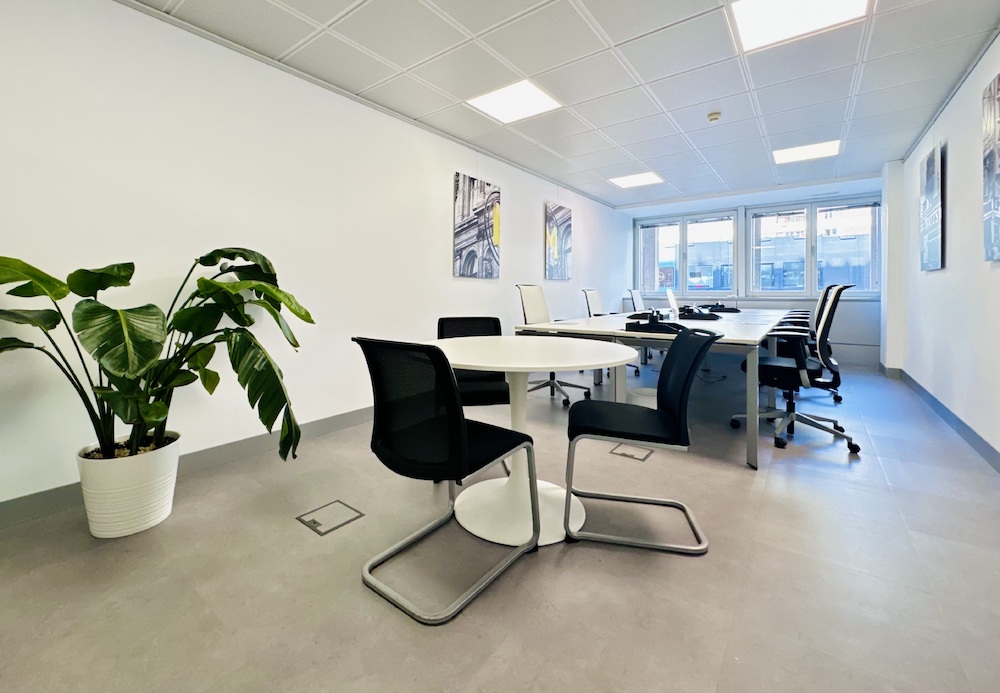From Ibercenter we share with you the common mistakes when starting a business
Starting a business is one of the most exciting and challenging decisions you can make in your professional life. However, while initial enthusiasm is a powerful driver, it can be easy to fall into a number of traps that, if not caught in time, can put the whole project at risk. Common mistakes when starting a business are more common than many people think, and the difference between success and failure often lies in the ability to identify and correct them before it is too late.
One of the reasons why these mistakes are so dangerous is because they are often a direct consequence of a lack of proper planning. When you go into business without a solid plan, without a clear vision of what you want to achieve and how you are going to do it, you expose your business to a series of problems that could have been avoided with a little more preparation. It is like navigating in an unknown sea without a map; the chances of getting lost or hitting an obstacle are high.
The consequences of not planning properly can be devastating. From a lack of sufficient funding, to the wrong choice of target market, to underestimating operating costs, to inappropriate selection of workspace, every misstep can cost time, money and, worst of all, the future of the business. An entrepreneur who does not take the time to prepare every aspect of his or her business is putting his or her investment and dreams at risk.
In short, avoiding common mistakes when starting a business is not just a matter of avoiding pitfalls, but of making sure that every decision is well informed and aligned with a strategic plan that guides the path to success. That is why, before launching into the world of entrepreneurship, it is essential to take the time to plan, analyse and anticipate potential challenges that may arise. It is this preparation that will make the difference between a business that thrives and one that falls by the wayside.

No clear business plan
One of the common mistakes when starting a business is the lack of a clear business plan. While the idea of starting a project with enthusiasm and energy may seem sufficient, the reality is that without proper planning, the chances of success are greatly reduced. A business plan is much more than just a document; it is the foundation on which the viability of a business is built. It defines the objectives, the strategies to achieve them, and provides a clear vision of what is to be achieved and how it will be achieved.
The importance of a business plan is that it acts as a guide, providing a structured framework for making informed decisions. It allows entrepreneurs to identify potential obstacles and prepare solutions before they become insurmountable problems. Without a plan, it is easy to lose direction, to become distracted by tasks that do not add real value or to spend resources on initiatives that are not aligned with the fundamental objectives of the business.
In addition, a well-developed plan is essential for attracting investors or raising finance, as it demonstrates that the project has been carefully thought through and that there is a clear strategy for success.
The absence of a business plan can also have serious consequences. Lack of planning can lead to poor financial management, such as underestimating costs or not foreseeing liquidity needs, often resulting in cash flow problems that can jeopardise business continuity.
In addition, without a plan, it is difficult to assess the performance of the business in an objective manner, preventing the necessary adjustments to improve and grow. Ultimately, the lack of a clear business plan can lead to project failure, as it lacks the vision and structure to address the challenges and opportunities that arise along the way.
In summary, one of the common mistakes when starting a business is not taking the time to develop a clear and detailed business plan. This mistake can have devastating consequences, as without strategic guidance, decisions are made reactively rather than proactively, which significantly increases the risk of failure. It is therefore essential to understand that a business plan is not a mere formality, but a crucial tool to ensure that the project has a solid foundation on which to grow and prosper.
Underestimating initial costs
One of the common mistakes when starting a business is underestimating the initial expenses, a trap that many entrepreneurs fall into when enthusiastically launching their project. It is easy to get carried away by optimism and think that with a tight budget the company can get off to a smooth start. However, the reality is often different, and the unforeseen expenses that inevitably arise can jeopardise the liquidity of the business from the very first steps.
When starting a business, there are always costs that were not foreseen. These can range from unexpected repairs to the premises, to the need to contract additional services or to face taxes or fees that had not been contemplated in the initial plan. Moreover, in many cases, entrepreneurs tend to underestimate the time it will take to generate sufficient income to cover all these expenses, which further aggravates the situation. The lack of liquidity that these unforeseen expenses can cause not only jeopardises the day-to-day running of the business, but also limits the ability to react to new opportunities or challenges.
The importance of a realistic budget cannot therefore be underestimated. A well thought-out budget not only includes the most obvious expenses, but should also include a margin for those unforeseen events that, although difficult to foresee, almost always turn up in the end. This financial cushion is essential to ensure that the business can continue to operate even when things do not go exactly as planned.
In addition, a realistic budget allows entrepreneurs to make more informed and strategic decisions, avoiding the stress and improvisation that often accompany a lack of financial planning.
In short, one of the common mistakes when starting a business is not taking the time to accurately calculate all initial expenses, including unforeseen costs that may arise. Underestimating these costs can lead to serious liquidity problems that, in many cases, could have been avoided with a more realistic budget and proper financial planning.
It is therefore crucial for any entrepreneur to understand the importance of preparing for the unexpected and ensuring that their business has the necessary resources to meet the challenges that will inevitably arise along the way.
Wrong choice of workspace
One of the common mistakes when starting a business is to choose the wrong workspace. Often, entrepreneurs focus on other aspects of the business and overlook the importance of the right environment. However, the space you work in not only affects productivity, but also the image you project and the satisfaction of your team.
Choosing a good workspace is crucial because it directly influences the development of daily activities. The right environment should facilitate concentration, collaboration and comfort. If you opt for a space that is poorly laid out, noisy or poorly lit, you will be compromising your team’s performance and the quality of work. In addition, an uncomfortable environment can lead to low employee morale, which translates into less motivation and, ultimately, lower productivity.
Among the most common mistakes when choosing an office or coworking space are selecting a place purely on price, without taking into account other key factors such as location or available services. It’s tempting to opt for office rentals in Madrid that look like a bargain, but if the space doesn’t meet your specific business needs, you’ll end up paying more in the long run, either in lost time or in additional resources to adapt the space.
The same goes for coworking spaces in Madrid, where the choice of the right place should go beyond monthly fees and consider factors such as access to meeting rooms, internet quality or the general atmosphere.
Failure to properly consider the location and the specific needs of your business can have significant consequences. A poorly located workspace can make access difficult for both employees and customers, which could negatively affect day-to-day operations and business opportunities.
In addition, if your chosen space is not suited to the growth or working dynamics of your business, you may find yourself having to move earlier than planned, which entails additional costs and the possibility of disruption to operations.
In short, one of the common mistakes when starting a business is not paying enough attention to the choice of workspace. Whether you opt for office rentals in Madrid or coworking spaces in Madrid, it is essential to consider all the aspects that impact the day-to-day running of your business. Choosing the right location not only helps to create a favourable working environment, but also helps to build a solid foundation for long-term success.
Not knowing the target audience
One of the common mistakes when starting a business is not clearly defining the target audience. When you don’t have a precise idea of who your ideal customer is, it’s easy to waste resources on ineffective marketing strategies and products or services that don’t connect with the right people. Identifying and segmenting your ideal customer is a critical step in correctly targeting your efforts and ensuring that you are delivering exactly what your market needs.
To identify and segment your ideal customer, it is essential to start with a detailed market analysis. This involves understanding who could benefit most from your product or service and what characteristics define that group. Factors such as age, economic status, geographic location and personal or professional interests are crucial to profiling your target audience. Knowing these nuances will allow you to tailor your offer to the specific needs of each segment, thus maximising the relevance of your proposition.
Not knowing your audience well carries significant risks. One of the main ones is that your marketing campaigns may not resonate with the right people, resulting in low ROI and ultimately unsatisfactory sales. In addition, if you don’t understand the needs and wants of your audience, you are likely to develop products or services that don’t align with what they are really looking for, which can lead to widespread disengagement and lost business opportunities.
In the context of services such as office rental in Madrid, if you do not segment correctly, you could target an audience that does not value the location or the services you offer, resulting in empty offices and an investment that does not generate the expected results.
Therefore, one of the common mistakes when starting a business is not taking the time to define and understand your target audience. With clear segmentation, you will not only be more effective in your marketing efforts, but you will also be able to offer a more personalised service tailored to your customers’ needs.
This not only improves customer satisfaction, but also strengthens the position of your business in a competitive market like Madrid, where both office rental and coworking spaces are highly valued options, but require a well-targeted offer to stand out.

Underestimating the importance of marketing
One of the common mistakes when starting a business is to underestimate the importance of marketing. Many entrepreneurs, especially those with a more technical or product-focused approach, tend to think that a good service or a quality product will sell itself. However, in a market as competitive as the one in Madrid, where there are multiple options for clients, such as office rentals in Madrid or coworking spaces in Madrid, marketing is essential to stand out and attract your target audience.
Common mistakes in marketing strategies often stem from a lack of planning and underestimating the impact that a well-executed campaign can have on the success of a business. One of the most common mistakes is not clearly defining marketing objectives or not knowing the target audience. This can lead to investments in channels or messages that do not generate results, wasting valuable resources.
Another common mistake is not maintaining an effective online presence. In the digital age, where most purchasing decisions start with an internet search, having a professional website and active social media presence is not only recommended, but essential. Without a solid online presence, you are missing out on the opportunity to be visible to a large part of your potential market, and you may not even be found.
Therefore, underestimating the importance of marketing can severely limit the growth of your business and cause you to fall behind the competition. In an environment where more and more businesses are competing for the attention of the same customers, a well-defined marketing strategy and an effective online presence are not only important, but essential to ensure that your business is positioned competitively in the marketplace.
Avoiding these mistakes and opting for robust, well-targeted marketing can make the difference between success and stagnation for your business.
Failure to delegate tasks
One of the common mistakes when starting a business is not delegating key tasks. Many entrepreneurs, especially those who have started their own project from scratch, tend to want to do everything themselves. This impulse, although understandable, can be counterproductive.
Believing that no one else can perform certain tasks with the same dedication or precision can lead to unnecessary burnout and inefficient time management. In a growing business, such as renting offices in Madrid or managing coworking spaces in Madrid, this approach limits the capacity for expansion and development.
The mistake of trying to take on all the tasks oneself not only overburdens the entrepreneur, but also prevents the business from reaching its full potential. When trying to do everything from administration to customer service to marketing strategy to financial management, it is easy to lose sight of priorities. Moreover, lack of specialisation in critical areas can lead to costly mistakes that could have been avoided with the help of experts in each field.
Knowing how and when to delegate functions is essential for the growth of any business. Delegating does not mean losing control, but rather distributing responsibilities so that each task is performed by the person best qualified to do it. This allows the entrepreneur to focus on the strategic areas where they can really make a difference, such as developing new services or expanding the business.
Delegating also has the benefit of fostering a more collaborative and motivating work environment. When employees or collaborators feel that they are trusted to carry out important tasks, their commitment to the project increases. This not only improves the quality of work, but also drives innovation and the development of new ideas.
To sum up, one of the common mistakes when starting a business is trying to do everything alone, which can stunt both personal and business growth. Learning to delegate is a critical step in freeing up time and energy that can be invested in growing the business sustainably and successfully.
The importance of networking
One of the common mistakes when starting a business is to ignore the importance of networking. Often, entrepreneurs focus so much on developing their product or service that they neglect a fundamental aspect for the growth of any project: building and maintaining a solid network of contacts. Networking is not just a matter of meeting people; it is a powerful tool for opening doors, generating business opportunities and finding strategic allies that can be crucial at key moments.
The benefits of building a network of contacts are innumerable. Being well-connected gives you access to valuable information, such as new trends or opportunities for collaboration, that might not be available to you if you remain isolated.
In addition, a strong network of contacts facilitates the exchange of experiences and advice, which can help you avoid mistakes and make more informed decisions. Don’t underestimate the power of word of mouth; a recommendation from someone you trust can often be the key to closing a deal or securing an important client.
On the other hand, the opportunities lost by not networking are difficult to quantify, but can be significant. Without a network of contacts, it is easy to be left out of the circuits where business opportunities are generated. This can translate into projects that never materialise, partnerships that never form or potential clients that never meet you. In the field of office rental in Madrid or coworking spaces in Madrid, where personal and professional relationships are essential, not networking can severely limit your ability to grow and expand. It is not only about missing out on business opportunities, but also about not being aware of what is happening in your sector, which can cause you to fall behind the competition.
In short, one of the common mistakes when starting a business is underestimating the importance of networking. Building a strong network of contacts not only helps you to be better informed and make better decisions, but also opens doors to a wealth of opportunities that might otherwise go unnoticed. Not networking is, in essence, closing yourself off from the possibility of growing your business organically and on the basis of trusting, mutually beneficial relationships.
Conclusion
In the process of entrepreneurship, common mistakes when starting a business can make the difference between success and failure. Along the way, we have seen how the lack of a clear business plan, underestimating start-up costs, choosing the wrong workspace, and not clearly defining the target audience are some of the most critical stumbling blocks. In addition, mistakes such as underestimating the importance of marketing, failing to delegate key tasks or ignoring the value of networking can severely limit the growth potential of any project.
To avoid making these mistakes, it is essential to start with thorough planning. A well-structured business plan serves as a roadmap, guiding every decision and helping to anticipate potential pitfalls. It is also crucial to draw up a realistic budget that includes not only foreseeable expenses, but also a margin for unforeseen events, thus avoiding liquidity problems that could jeopardise the business from the outset.
Choosing a workspace that suits your company’s needs, whether by renting offices in Madrid or exploring coworking spaces in Madrid, is also a decision that should not be taken lightly, as the environment in which you operate has a direct impact on the productivity and image of your business.
Defining precisely who your ideal customer is and how to reach them is another essential step. Not knowing your audience well can lead to wasting time and resources on ineffective strategies. On the other hand, don’t underestimate the role of marketing and the importance of having a strong online presence; in today’s digital environment, this is critical to attracting and retaining customers. Similarly, learning to delegate tasks is key to freeing up time and resources to focus on areas where you can really add value. Finally, networking should never be ignored. Building a solid network of contacts can open doors that would otherwise remain closed, facilitating strategic alliances and business opportunities.
In short, avoiding these common mistakes when starting a business requires a combination of planning, analysis and a willingness to learn and adapt. By doing so, you will not only increase your chances of success, but you will also be building a solid foundation for long-term, sustainable growth in a market as competitive as Madrid.






